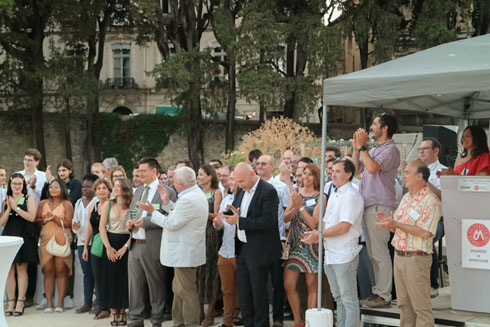The Montpellier University Space Center and the Van Allen Foundation celebrate their 10th anniversary at the "Montpellier Space Odyssey" gala.
On June 29, the Orangerie du Jardin des Plantes at the University of Montpellier hosted the "L'odyssée Spatiale Montpelliéraine" gala to celebrate a decade of work, support, and projects by the Van Allen Foundation (FVA) and the University of Montpellier Space Center (CSUM). The gala was also an opportunity to celebrate the 10th anniversary of the first French nanosatellite sent into orbit. Attending the event were Philippe Augé, President of the University of Montpellier, Jean-Claude Gayssot, former minister and President of the FVA, and Laurent Dusseau, Director of the FVA and CSUM.

The Space Center at the University of Montpellier
Created in 2011, the Montpellier University Space Center (CSUM) is the French leader in the development and launch of student nanosatellites. As a technology platform for the University of Montpellier, its team of around 30 people welcomes and supervises French and international students, from two to eight years of higher education, as part of projects or internships. The CSUM has a wide range of equipment at its disposal: a Concurrent Engineering Center (a collaborative work tool that simulates all aspects of a mission to assess its feasibility), ground stations (S-band and UHF, communication with the satellite via a radio frequency link), a control room (mission control and monitoring), a clean room (controlled environment for integrating nanosatellites and welcoming students enrolled in partner training programs to train them in Assembly, Integration, and Testing), a thermal vacuum chamber (for reproducing the thermal environment in orbit), and soon a vibration test machine for mechanical testing.
With its positioning as a systems integrator and platform provider, the UM Space Center offers end users the opportunity to carry out complete missions, launch payloads, or perform in-orbit technology validation. The CSUM therefore offers turnkey solutions, from feasibility studies to operations.
The Van Allen Foundation
Created at the end of 2012, the Van Allen Foundation (FVA), a partnership foundation of the University of Montpellier, provides strategic and financial support to the UM Space Center. It brings together players in the nanospace sector as well as new entrants and acts as a catalyst for generating collaborative projects. The FVA also helps define training needs. Since its creation, 200 student internships have been funded, with €2.8 million invested in the Montpellier University Space Center and its nanosatellite projects.
The FVA's actions focus on three objectives: Developing an emerging sector in France (financing CSUM nanosatellite projects), Building and facilitating a network (organizing conferences for the general public, technical workshops, promoting activities, and facilitating the Foundation's Partners and Friends Club), Training the next generation of space industry talent (funding equipment, internships, theses, and supervisory staff).
More than 10 years of existence, projects, technological developments, and above all, support
Starting from scratch, the Van Allen Foundation and the UM University Space Center have succeeded, through remarkable work, projects, and actions, in gaining significant legitimacy and a major role in France and Europe. After more than 10 years of technological development and acquisition of expertise in the design of nanosatellites, UM now has its own technology.
A nanosatellite weighs between 1 and 50 kg. It allows universities and startups to conduct in-flight technology demonstrations and/or carry a scientific instrument called a "payload" at an affordable cost. ROBUSTA 1A, launched in 2012, was the first French nanosatellite in orbit. Two other nanosatellites have since been launched by the CSUM. One of them, ROBUSTA-1B, launched in June 2017, is still in orbit. Two other nanosatellites are scheduled to be launched from Kourou by VEGA-C in the coming days. As for ROBUSTA-3A, which will be launched in 2023 on the maiden flight of Ariane 6, it will inaugurate the CSUM's new 3U platform as part of the Mediterranean project. Its mission: an experiment to improve meteorological models for forecasting Cévenol episodes.
In 2020, the FVA created its Scientific Committee, whose mission is to draft calls for ideas and evaluate the scientific interest and relevance of the responses. By co-financing the selected research projects, the Van Allen Foundation enables the Montpellier University Space Center to focus its nanosatellite missions on promising topics. The project selected during the first call for ideas concerns the detection of plastic waste in the Mediterranean Sea.
The CSUM and the FVA also represent an opening toward countries in the Global South, which fits perfectly within the framework of the I-SITE program of excellence led by the UM.
As part of a program to acquire skills in the space sector, Research Ministry of Higher Education and Research sent ten students to study at the University of Montpellier in 2020. Five graduated with a professional bachelor's degree in Assembly, Integration, and Testing, and five with a specialized master's degree in Space Systems Development. These students, currently hosted at the Montpellier University Space Center, are developing the HYDROSAT Mission, which aims to meet Djibouti's data collection needs. Two CubeSats using the CSUM's 1U platform are scheduled for launch in early 2023.
In 2021, Senegal's Ministry of Higher Education, Research Innovation (MESRI-SN) also set up a training program in partnership with CSUM that should give Senegal its own space access capabilities. This program includes an academic component and the completion of a first space mission with both educational and practical objectives.
In summary, for more than ten years, the Van Allen Foundation and the University Space Center at the University of Montpellier have been involved in transferring knowledge to all students, drawing on expertise acquired from the biggest names in French space exploration, cutting-edge equipment, and technology developed entirely by the University of Montpellier.